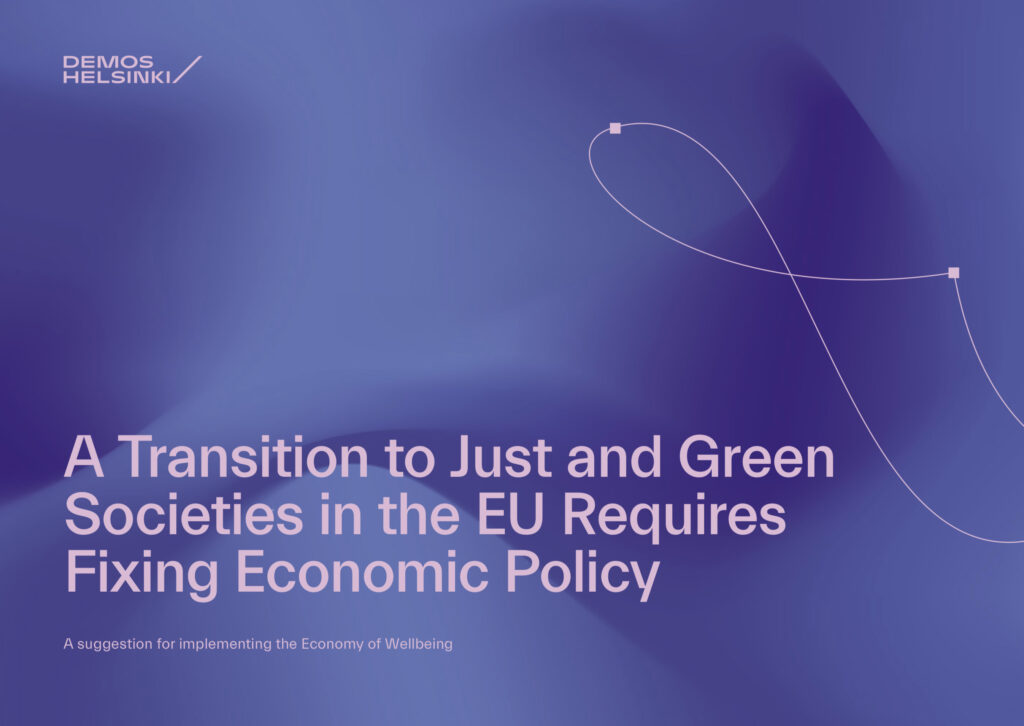There is a lack of shared understanding on the problems that hinder the transformative capabilities of the EU Member States. Without this shared understanding, also lacking are a common direction and actions. This publication is about the concept “Economy of Wellbeing” – an approach that seeks to aid the transformation towards just and fair societies in the European Union.
This publication is about the concept “Economy of Wellbeing” – an approach that seeks to aid the transformation towards just and fair societies in the European Union.
A core sentiment in the publication is that there is a lack of shared understanding on the problems that hinder the transformative capabilities of the EU Member States. Without this shared understanding, also lacking are a common direction and actions.
This publication was written primarily for economic thinkers and decision-makers within the EU. It proposes that the explanation of why transformation is slow or nonexistent lies within the current economic policy paradigm.
To fix economic policy, a new macroeconomic approach based on broader goals is required. These goals should be people-centric (aiming to increase wellbeing) and forward-thinking (sustainable). This is the basis for the “Economy of Wellbeing”, a new policy approach that focuses on taking wellbeing into account in all policies. Advocated by multiple EU and OECD countries and civil society actors, the Economy of Wellbeing was also one of the priorities during the Finnish EU Council’s Presidency 2019. During the presidency, conclusions by the Employment, Social Policy, Health and Consumer Affairs Council configuration (EPSCO) of the European Union laid down a shared understanding of the approach’s basic principles. This publication builds on these insights and aims to contribute to the discussion.
At the core of the Economy of Wellbeing is the goal of taking wellbeing into account in all policies. This is vitally important to the EU’s economic growth, productivity, long-term fiscal sustainability and societal stability. Thus, Demos Helsinki proposes that the Economy of Wellbeing approach has the potential of becoming a new guiding paradigm for economic policy.
Building on the EPSCO council conclusions on the Economy of Wellbeing, this publication proposes a shared problem, a shared direction and shared actions for the EU and the member states. The proposed shared problem is the inability of the EU to transform towards just and green societies because of the constantly less effective economic policy. The proposed shared direction is the economy of wellbeing as a new paradigm for economic policy. Further, a shared action plan, consisting of seven tracks of action, is proposed in the publication.
Europeans deserve an economy that works for them. The Economy of Wellbeing can help the EU and the Member States to create such an economy.
The publication was funded by the European Union’s Health Programme (2014-2020) and The Ministry of Social Affairs and Health of Finland. The goal was to refine the ministry’s definitions on the economy of wellbeing. Demos Helsinki based the publication on the results of a high-profile conference focused on the economy of wellbeing, the EU Council’s conclusions on the theme, and expert interviews. The publication was presented in Brussels in January 2020.
For more information on the Economy of Wellbeing, you can contact
Leena Alanko, leena.alanko@demoshelsinki.fi, +358 50 537 3393


The Economy of Wellbeing – a new narrative
Post
March 26, 2021
Designing policies for a wellbeing economy — learnings from Finland
Post
December 2, 2021
For a wellbeing economy, we need to transform governance
Post
March 31, 2023
How to introduce a wellbeing economy model
Post
June 30, 2022
Letter: After the crisis, let’s not bounce back. Let’s leap into the future.
Post
March 31, 2020
Reorienting the aim of the economy to increase the transformative capabilities of the EU
Post
January 28, 2020
What is new economic thinking?
Post
January 11, 2022
Policy Brief: Paths to a wellbeing economy
Publication
June 30, 2022
‘The Economy of Wellbeing’ Builds Sustainable European Union
Project
February 1, 2020
New economic thinking in Finland — Action on the fringes
Post
January 11, 2022
New economic thinking in France — A small but vibrant space
Post
January 11, 2022
New economic thinking in Greece — “Pregnant” with promise
Post
January 11, 2022
New economic thinking in the UK — A curious paradox
Post
January 11, 2022